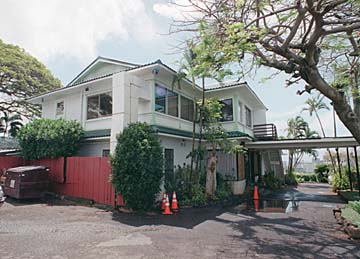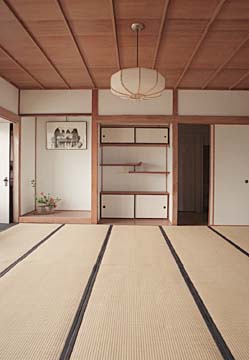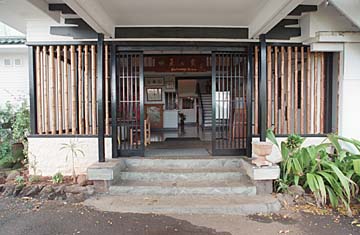

NEIGHBORHOODS

Alewa teahouse one
By Rod Ohira
of the last of its kind
Star-BulletinNatsunoya Tea House on the slopes of Alewa Heights has helped to provide special memories for four generations of Tsumoru Ishimoto's family.
The Ishimotos have been celebrating anniversaries, birthdays, weddings, reunions and graduations at Honolulu's oldest teahouse since the mid-'60s.
"We've kind of grown up with the staff, and it's easy because they know what we like," said Michele Vandenburg, the eldest of Ishimoto's five children.
"The food is good, and the staff is almost like family to us."

There are enough longtime customers like the Ishimotos for Natsunoya to maintain five full-time and 25 part-time employees, but competition from restaurants and hotel ballrooms has cut into the once-thriving Japanese teahouse business.Currently, there are only two teahouses in Honolulu -- Natsunoya and Nuuanu Onsen Inc. at 87 Laimi Road. As recently as 1988, there were five, but Kanraku in Kapalama, Kyo-ya in Waikiki and Rainbow Garden in Moiliili have since closed.
"It's a dying industry," says Lawrence Fujiwara Jr., who has been running Natsunoya since the death of his father in 1996. "But this place has a lot of charm, and people still come here for the atmosphere and tradition. It's a place where they can feel comfortable."

Looking out from the second-floor party room at the spectacular view of Honolulu, Fujiwara notes that location is still a big advantage."The view is the same," he says. "You can see all of Honolulu's city lights even though there are more obstructions now than there used to be."
With the help of friends and staff, Fujiwara is repairing and painting the 78-year-old two-story wooden Natsunoya Tea House building at 1935 Makanani Drive and looking at marketing plans to attract a new generation of customers.
"My first project was to fix the place up, and it's cost about $100,000 so far," Fujiwara said. "But if I had to hire someone, our cost would have tripled.
"We're trying to make the place look more like a museum to preserve our Japanese heritage."
At the same time, he's opened up the menu to include $18-per-person buffets for parties and has ventured out into catering.
"We're doing lacquer-box bentos, where we deliver and then go back to pick up the boxes," he said.
"We also do regular bentos. Last Labor Day, we did 11,400 bentos for Unity House. Friends, relatives and staff cooked for three days for that one."
Natsunoya's reputation is built on good food, and head chef Masao Matsuda -- known for his intricate food sculptures, called ikezukuri, as well as his cooking -- Japanese food specialist Chikao Yasui, and sushi chef Hidemoto Kawai all have been with the Fujiwaras for over 25 years.
"We're thinking about opening up for lunch a couple of days a week to kill the dead time," Fujiwara said.

Natsunoya can trace its roots back to the 1906 San Francisco earthquake."My grandfather lost everything he owned in the earthquake and went back to Japan," Fujiwara said. "He was returning to San Francisco years later when he stopped in Hawaii and decided to stay."
Shuichi and Taneyo Fujiwara, Lawrence's grandparents who were immigrants from Shikoku, Japan, purchased the nearly 1-acre Alewa Heights property from the McInerny family and opened Shunchoro Tea House in 1921.
"My grandfather liked the view, and this was the first building on the hill," Lawrence Fujiwara said. "He had to build his own road and put up the (utility) poles."
The government took over Shunchoro Tea House during World War II and converted the building into an emergency fire and first-aid station.
After the war, the elder Fujiwaras leased the teahouse to the late Mamoru Kobayashi, who ran it until the mid-'50s.
Lawrence Sr., youngest of Shuichi and Taneyo Fujiwara's five children, had opened his own teahouse on School Street after the war. It was called Natsunoya.

"They eventually tore it down for the H-1 freeway," Lawrence Jr. said.Shunchoro had been closed for a couple of years when Lawrence Sr. reopened the teahouse and changed its name to Natsunoya in 1958.
The late Dr. Thomas Fujiwara, co-founder of Central Medical Clinic and Lawrence Sr.'s brother, became the owner of the Alewa Heights property during that period.
John Wayne, Kirk Douglas, Pittsburgh Steelers former running back Franco Harris, sumo star Konishiki and military generals are among Natsunoya's prominent visitors.
Dorothy Tokairin Kameda, general manager of Nuuanu Onsen Inc. since 1969, says her teahouse cannot compete with Natsunoya.
"We're small compared to them," says Kameda, noting that she only has six part-time employees.
Jinshichi Tokairin, who purchased Nuuanu Onsen Inc. in the 1930s, was the teahouse's fourth owner.
"The good thing is, we own the land," Kameda said. "If it weren't for that, we couldn't survive."
Nothing -- not age or even a heart attack -- keeps Crispin Mancao from playing his favorite sport. Neighbors
The 84-year-old Honolulu man was the only Hawaii player on the 1961 Hawaii Islanders baseball team.
He has coached baseball at schools and continues to play on senior teams. Mancao recently was honored by the Hawaii Medical Service Association as one of six "Ageless Heroes." He was the winner of the "Vigor and Vitality" award.
The "heroes" in other categories:
"Community Involvement" -- Georgia Morikawa, 70, of Honolulu. Deaf since birth, Morikawa teaches American Sign Language courses for hearing students at Kapiolani Community College.
"Love of Learning" -- Meheroo Jussawalla, 75, of Honolulu. She overcame immigration, single parenting and other hardships to become an expert in information economics.
"Creative Expressions" -- Virginia Isbell, 66, of Kealakekua, Big Island. Though known for many years as a state legislator, Isbell was recognized by HMSA for her love of music and performing. She plays and sings classic Hawaiian songs.
"Against the Odds" -- Thomas Mastin, 74, of Pearl City. After 20 years in the Army and Air Force, Mastin began a new career in data processing for the Defense Department -- and a battle against cancer. All members of his family died of cancer, and he has fought three life-threatening cancers. He helps other cancer patients, volunteering at Tripler Army Medical Center.
"Bridging the Generations" -- Leslie Medeiros Sr., 80, of Wailuku, Maui. Plans to travel with his wife after retirement fell apart for Medeiros when she suffered a stroke in 1977 and went into a coma. She came out of the coma after a month but remained bedridden. For 20 years, until she died a year ago, Medeiros cared for his wife. His granddaughter, Leslie-Jo, nominated him for an award, describing him as "the most loving, kind, caring and giving person I've ever known."
By Helen Altonn, Star-Bulletin